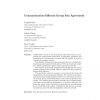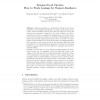53 search results - page 9 / 11 » Secure Commitment Against A Powerful Adversary |
SEC
2001
13 years 8 months ago
2001
Abstract Traditionally, research in secure group key agreement focuses on minimizing the computational overhead for cryptographic operations, and minimizing the communication overh...
IACR
2011
12 years 6 months ago
2011
Abstract. Tampering attacks are cryptanalytic attacks on the implementation of cryptographic algorithms (e.g., smart cards), where an adversary introduces faults with the hope that...
JCP
2007
13 years 6 months ago
2007
Abstract— Converting a secure group key agreement protocol into password-based setting is not a trivial task. The security of a password-based scheme hinges on preventing diction...
ASIACRYPT
2010
Springer
13 years 5 months ago
2010
Springer
Blinding is a popular and well-known countermeasure to protect public-key cryptosystems against side-channel attacks. The high level idea is to randomize an exponentiation in order...
ACNS
2003
Springer
14 years 7 days ago
2003
Springer
1 We describe a side-channel attack on a substitution block, which is usually implemented as a table lookup operation. In particular, we have investigated smartcard implementations...


